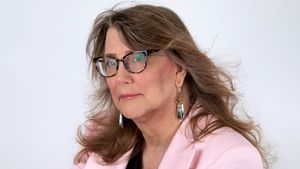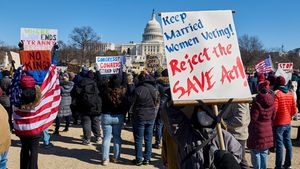Entertainment
CONTACTAbout UsCAREER OPPORTUNITIESADVERTISE WITH USPRIVACY POLICYPRIVACY PREFERENCESTERMS OF USELEGAL NOTICE
© 2025 Pride Publishing Inc.
All Rights reserved
All Rights reserved
By continuing to use our site, you agree to our Private Policy and Terms of Use.
Not long after the unauthorized biography Susan Sontag: The Making of an Icon by Carl Rollyson and Lisa Paddock was published in 2000, I ran into Sontagone of Americas leading intellectuals, who died on December 28that the Brooklyn Academy of Music. I asked her if she would agree to an interview with me that touched on various issues in the book, including her sexuality. I thought she might be open to such a discussionshe hadnt been beforebecause Joan Acocellas profile of her had just come out in The New Yorker, in which Sontag went on record as saying that she had had relationships with both women and men. Sontag didnt name any of them. She certainly didnt name the photographer Annie Leibovitz, the person whom many writers, since Sontags death, have said should have been mentioned as a partner in her New York Times obituary, even though Sontag tended to describe their relationship as that of close friends.
At the theater that night, Sontag told me to call her the next day. I did. On the phone, she said she didnt want to do an on-the-record interview about the biography, about which she didnt disclose if she had read or not but which she called regrettable. Mostly, we talked about what we had seen at BAMa production directed by Ingmar Bergman. We did, however, eventually drift into sexuality; I had just become editor of Out, and, in a characteristic display of her ability to engage you (she was the most insatiably curious person Ive ever met, seductively so), heres the gist. The following is quoted directly from my journal entry for the day.
She said that she couldnt understand why anyone would be interested in her sexuality except as gossip. She said that as a living, breathing human being she had had affairs with both men and women, mostly men before age 40, women after. Nothing about that seemed remarkable to her. I told her that she was being disingenuous, that she was a prominent public person, especially in New York, and that, of course, people, gay men and lesbians in particular, being among her most passionate admirers, looked to her for leadership in the areas of literature, culture, and politics. In America, gay people were constantly being targeted by politicians, and that the more prominent people who came out, and who attacked the attackers, the better.
She said that she didnt feel comfortable as a spokesperson for gay issues. There were plenty of people who bravely occupied that niche and she had always supported them. I questioned whether she had always supported them. I argued that she shouldnt think of coming out and of speaking up about sexuality as a narrow matter of private life but as part of her larger interest in human freedom. How can you say youre interested in liberty, I asked, and be so reticent about asserting your own? She got angry, started doing what she did incomparably well: deflating an argument. I got angry, too, so most of what she said about identity politics and a freedom more universal than particular was lost on me. It all seemed utterly French, and not in a good way.
When she had finished, I decided, what the hell, to get sentimental. I told her that as a high-school student growing up in a small Midwestern town I had felt isolated because of the things I was interested in. I said that her writing had made me feel less alone. I asked: Dont you feel that your ability to awaken peoples passions would be increased if you came outit would give gay and lesbian readers another powerful thing to connect to?
She said she was happy her books had been a lifeline to me. (It got emotional at that point.) But that it was more important for her to awaken peoples political and intellectual passions than those concerning sexuality. If she could animate the former, then the latter would take care of itself. I asked if her unwillingness to come out was a generational thing. You may be onto something there, she responded, continuing, I grew up in a time when the modus operandi was the open secret. Im used to that, and quite OK with it. Intellectually, I know why I havent spoken more about my sexuality, but I do wonder if I havent repressed something there to my detriment. (Sontag touched on this subjectthe psychology of repression and its relation to pathologyin an eloquent passage of Illness as Metaphor.) She added, Maybe I could have given comfort to some people if I had dealt with the subject of my private sexuality more, but its never been my prime mission to give comfort, unless somebodys in drastic need. Id rather give pleasure, or shake things up.
I said all this would make for a fascinating essay, and that it was too bad she had never written it. She said she doubted she would ever take up this topic.
Compared to the work, who cares about the biography?
Oh, everybody, I replied.
I told her again that she was underestimating her influence, and taking the easy way outno small irony for someone who had long championed the Difficult. She laughed, and the change of mood allowed us to engage in the very thing she had criticized in the Rollyson and Paddock book: gossip. Among the names mentioned: Mark Morris (hes getting fatter), Salman Rushdie, Tina Brown (Talks trashy), David Rieff, Edmund White, Toni Morrison (seriously overrated), Carlos Fuentes, Bill Clinton (Rwandadisgraceful). We spoke for a long while about the Yugoslavian writer Danilo Kis, whom we had both known and whose work we both admired. And, of course, there was talk of Annie Leibovitz.
Recommended Stories for You
From our Sponsors
Most Popular
39 LGBTQ+ celebs you can follow on OnlyFans
November 19 2024 9:39 AM
27 LGBTQ+ reality dating shows & where to watch them
March 24 2025 11:32 AM
21 times male celebrities had to come out as straight
November 19 2024 3:33 PM
17 queens who quit or retired from drag after 'RuPaul's Drag Race'
November 30 2024 12:26 AM
Love is in the air! Unforgettable gay kissing scenes from TV & movies
February 12 2025 3:07 AM
48 steamy celebrity Calvin Klein ads the gays won't forget
March 17 2025 5:42 PM
Murray Bartlett's 8 best gay roles in TV shows & movies
February 12 2025 2:33 PM
29 out & proud LGBTQ+ country artists you should be listening to
April 15 2025 3:21 PM
Maturing is sexy! 11 gay celebs who prove 'twink death' is a total myth
October 21 2024 10:51 AM
Ranking the highest-earning queens in 'RuPaul's Drag Race' herstory
October 25 2024 4:04 PM
More Videos
0 seconds of 3 minutes, 45 secondsVolume 0%
Press shift question mark to access a list of keyboard shortcuts
Keyboard Shortcuts
Shortcuts Open/Close/ or ?
Play/PauseSPACE
Increase Volume↑
Decrease Volume↓
Seek Forward→
Seek Backward←
Captions On/Offc
Fullscreen/Exit Fullscreenf
Mute/Unmutem
Decrease Caption Size-
Increase Caption Size+ or =
Seek %0-9
Copied
Live
00:00
03:45
03:45
Latest Stories
Here's how to watch Lady Gaga at Coachella & full livestream schedule
April 15 2025 1:49 PM
Betty Boop's real-life boyfriend is gay, gorgeous, and spreading joy on Broadway
April 15 2025 12:00 PM
New sapphic 'Black Mirror' episode features 'San Junipero' Easter egg
April 14 2025 2:16 PM
Need survival tactics? Ask 'The Last of Us' cast
April 13 2025 12:00 PM
Troye Sivan, Billie Eilish, Lorde turn Charli XCX's Coachella set into gay 'Brat' heaven
April 13 2025 12:13 AM
Ian McKellen makes 14-year-old boy's dream come true by starring in his LGBTQ+ film
April 15 2025 12:58 PM
Is Cate Blanchett retiring? Here's what we know
April 15 2025 10:17 AM
Laith Ashley dishes on 'very, very gay' Revry series 'Unconventional'
April 14 2025 7:10 PM
Mickey Rourke leaves 'Celebrity Big Brother UK' after 'unacceptable behavior'
April 14 2025 1:49 PM
How trans musician Sasha Allen won the heart of America — and Adore Delano
April 14 2025 7:52 PM
The internet reacts to Ellie and Dina's 'The Last of Us' kiss
April 14 2025 4:25 PM
Dylan Efron strips down to a towel in skincare routine video
April 14 2025 1:18 PM
Unearth the homoerotic art of Impressionist Gustave Caillebotte
April 13 2025 11:00 AM
























































































